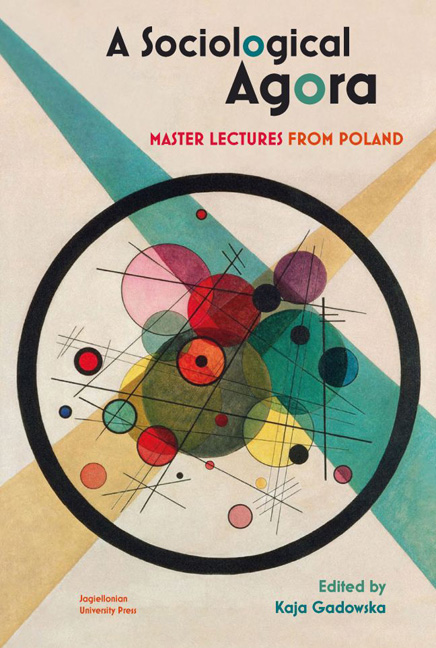Book contents
- Frontmatter
- Contents
- Society in a Time of Pandemia: Postmodern Problems from a Social and Humanistic Perspective
- Trust and Risk in the Time of Pandemia
- The Mythologized Populist Imagination, Carnival Rebellion, and the Fate of Liberal Democracy
- Applied Feminism: Women’s Rebellion and Identity
- On Law and its Interpretative Artifacts
- On Legal Nihilism Once More: Lessons from Poland
- Minima iuridica: Reflections on certain legal (un)obviousnesses
- Community—Meaning What?
- An Essay on Welfare: Problematic and Debatable Issues
- Sources of an Ecclesiastical System Success
- About the Authors
- About the Editor
- About the Translator
- Polish Sociological Association
On Legal Nihilism Once More: Lessons from Poland
Published online by Cambridge University Press: 01 March 2024
- Frontmatter
- Contents
- Society in a Time of Pandemia: Postmodern Problems from a Social and Humanistic Perspective
- Trust and Risk in the Time of Pandemia
- The Mythologized Populist Imagination, Carnival Rebellion, and the Fate of Liberal Democracy
- Applied Feminism: Women’s Rebellion and Identity
- On Law and its Interpretative Artifacts
- On Legal Nihilism Once More: Lessons from Poland
- Minima iuridica: Reflections on certain legal (un)obviousnesses
- Community—Meaning What?
- An Essay on Welfare: Problematic and Debatable Issues
- Sources of an Ecclesiastical System Success
- About the Authors
- About the Editor
- About the Translator
- Polish Sociological Association
Summary
INTRODUCTION
It was a certain experience of deja vu that instigated an idea to compare and contrast the model of cultural legalism (i.e., the deeply rooted in European culture perception of the law as an autonomous institution) with the model of legal nihilism. In Poland (as well as in other postcommunist, Central Eastern European states), the surrounding legal reality (i.e., the creation and application of law) has come to resemble a passing ethereality even though the preexisting reality had been overcome with great difficulty. It was a journey over a bumpy road to establish constitutional democracy and the rule of law in the region after 1989.
Accompanying the unsettling sensation of deja vu was a question: how is it possible that—after three decades of relatively successful efforts to construct a democracy functioning on the principle of the rule of law—we are witnessing blatant abuse of the constitution, open contempt for the law, and a consciously coordinated destruction of the authority inherent to the system of justice (especially of judges, but also other legal professionals)? Another matter coming to mind is whether a return to legal nihilism is reflected in the general consciousness. If so, then this would mean a definitive reversal—from a pro-Western to a pro-Eastern stance—in the transformative direction taken in Poland after 1989. Do the opinions of Poles complement the social, systemic, and psychological changes orchestrated by the government? These are big questions and difficult ones.
My lecture stands as an attempt to delve deeper into these issues, to better understand the current situation, and to unveil possible ways out of this predicament. Undertaking this endeavor, I will refer to two ideal models of sociological concepts of law in society. The findings of my analysis will be illustrated by statistical data documenting the process of lawmaking in Poland as well as by the results of a survey conducted between July and August 2020 on Polish attitudes towards the law.
As for legal nihilism, I define it here as something more than the mere instrumental subordination of law by politics or the mere disavowal of a normative legal certainty. Instead, it is the negation of the law as a value and an important cultural and civilizational achievement—an effect of a specific civilizational process experienced by Europe (and the West writ large).
- Type
- Chapter
- Information
- A Sociological AgoraMaster Lectures from Poland, pp. 101 - 118Publisher: Jagiellonian University PressPrint publication year: 2023



